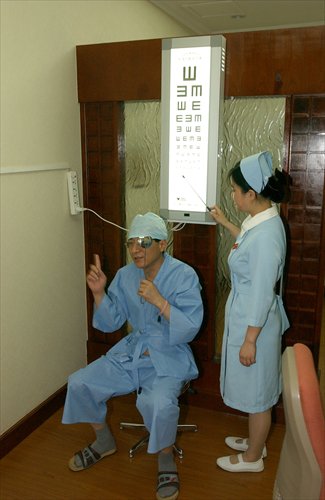HOME >> CHINA
Sick business
By Wang Yiqiong Source:Global Times Published: 2014-2-17 20:58:01

A man gets his eyesight checked at a healthcare center in Beijing. Photo:IC
"I felt like a cow being herded through a slaughterhouse."
Richard Cyr, an American physician, was commenting on receiving physical examinations in Beijing. During his seven-year stint in China he had to undergo six of these examinations, three of which were at private clinics.
He told the Global Times via e-mail that he was "moved in an assembly line from room to room" and "poked and prodded in all sorts of embarrassing places."
"And yet everyone around me seemed completely happy and reassured that they were getting 'checked out,' " Cyr said.
With a growing economy and a deteriorating environment, more and more Chinese have begun to spend their time and money on healthcare, resulting in a boom in the industry. But this growth has also created room for unscrupulous operators to charge for unnecessary services.
Unnecessary treatment
Cyr said he was very disturbed that many of the tests he was subjected to were not necessary.
Take cancer screening for example; Cyr said there is a lot of evidence that pap smears, mammograms and colonoscopies can save lives for people of specific age groups in particular. But "very few other cancer screening tests are effective, including chest x-rays and the PSA test," he said.
Liu Sirun, a professor at the medical image center of the First Affiliated Hospital of Jinan University, told the New Express that excessive radioactive tests can damage health. In the past, children had to receive chest X-rays before going to school, Liu said.
But in 2006, a national regulation was issued to stop children under 14 from receiving compulsory chest X-rays.
In Cyr's opinion, staff at private health check centers have not been recommending the appropriate packages according to the customer's actual needs, the Guangzhou-based Nandu Weekly reported. "Because they are salespeople, not doctors, they prefer to recommend more expensive packages," he told the Nandu Weekly.
Wang Xintai (pseudonym), a doctor from the radiation therapy department of the Beijing Xuanwu Hospital, said that compared to public hospitals, private institutions offer much warmer services but they tend to exaggerate certain disease rates in the population to persuade more people to have examinations.
Wang often takes his father to health checks. As a doctor, he knows what items his father needs. He would "pick package B and add few items from package C to combine them together."
But he admitted it is hard for most people to choose from all those packages as they lack the necessary medical knowledge. "Some believe the more tests the better," Wang said.
The New Express revealed one case involving a 32-year-old woman, who was worried that she might have hyperplasia of the mammary glands. The doctor suggested ultrasound checks, but she thought it was far from enough and angrily told the doctor that she could afford to take more tests.
The doctor had to explain to her that women under the age of 40 don't need X-rays or MRIs if there are no obvious cancer symptoms.
Medicines are also pushed on unwary buyers. Yao Hui, 64, from Shenyang, Northeast China's Liaoning Province, was given a coupon that enabled him to buy a 350 yuan ($58) exam with only 28 yuan. He went to check his prostate at a local hospital and the doctor told him his problem was quite serious, so he bought 20 boxes of medicine.
However, when he saw a second doctor he was told his problem was a common one, which required no extra attention.
Booming business
Last year, 5.04 million people took health checks in Beijing, which has over 200 registered health check centers, both public and private, according to a Beijing Television Station report.
Physical exam services require much less investment and fewer professional staff compared to the research and development of medicines or manufacturing of medical devices, making it a more attractive industry to investors.
The Carlyle Group, Goldman Sachs and other investors have all invested in private health check centers in China, a sector which is predicted to grow 12-fold in the next eight years, according to the Nandu Weekly.
Frost & Sullivan, a US-based market consulting firm, predicts that the physical examination market will reach 300 billion yuan ($49.44 billion) by 2020.
By then, the revenue of the health service industry will account for 10 percent of the GDP of China, according to a report by Roland Berger Strategy Consultants.
A better way?
Physicians point out that despite the problems in the system, health checks remain necessary, but they also say that improvements can be made.
Zhao Liwei, a professor at the Jilin Medical College in Northeast China's Jilin Province, suggested that physical exams should be carried out on regular basis, especially diseases related to professions.
Zhao was a practicing doctor at her college's affiliated hospital and learned that although many companies pay for their employees' health checks, "some local companies never organize employees to take health exams."
She said that this year, thyroid scans were added to standard exams and actually found many thyroid cancer cases. "Other common cancers like lung cancer, stomach cancer and intestinal cancer will also be checked."
Wang also highlighted the necessity of regular checks for elderly people, but said young people don't usually need lots of tests.
Wang used to study at the Massachusetts General Hospital in Boston, and said that compared to China, the US spends more on prevention than treatment, and this saves money.
"We need a guide book to tell people what checks are necessary and what are not," said Wang. "We also need better regulations for the industry."
There have been some moves in this direction. Beijing Television reported that the Beijing Heath Management Association has been drafting a regulation on physical exams which is to be issued later this year.
Posted in: Society